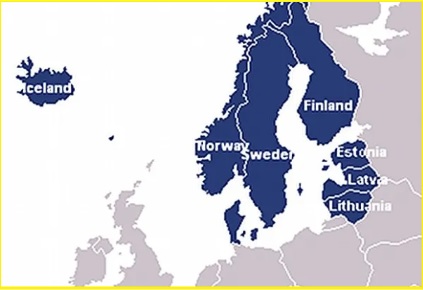International Relations
2nd CII India Nordic-Baltic Business Conclave 2023
- 25 Nov 2023
- 7 min read
For Prelims: 2nd CII India Nordic-Baltic Business Conclave 2023, Nordic Baltic (NB) 8, Blue Economy to enhance Global Supply Chain Resilience,Renewable Energy, Global South through G20, CII (Confederation of Indian Industries).
For Mains: 2nd CII India Nordic-Baltic Business Conclave 2023, Bilateral, regional and global groupings and agreements involving India and/or affecting India’s interests.
Why in News?
Recently, the 2nd CII (Confederation of Indian Industries) India Nordic-Baltic Business Conclave 2023 was held in New Delhi, aiming to foster collaboration between India and the Nordic Baltic Eight (NB8) countries, known for their prowess in innovation and technology.
What is Nordic Baltic (NB) 8?
- The NB8 is a regional cooperation format that brings together the Nordic countries and the Baltic states.
- It comprises five Nordic countries: Denmark, Finland, Iceland, Norway, and Sweden, along with three Baltic states: Estonia, Latvia, and Lithuania.
- The group shares historical, cultural, and geographical ties, fostering collaboration and cooperation in various fields, including politics, economics, trade, security, and culture.
- While the Nordic countries are located in Northern Europe and share similarities in governance, social systems, and values, the Baltic states are situated in Northeastern Europe and have their unique historical backgrounds and geopolitical positioning.
What are the Key Highlights of the Conclave?
- Food Processing and Sustainability:
- Discussions focused on transforming food systems towards sustainability by sharing experiences, innovations, and best practices between India and the Nordic-Baltic nations.
- Collaboration aimed to address global challenges with a holistic approach encompassing economic, social, and environmental dimensions.
- Blue Economy and Maritime Cooperation:
- Emphasis was placed on efficient management of the Blue Economy to enhance Global Supply Chain Resilience, promote sustainable marine practices, encourage innovation, and foster greater maritime cooperation between India and the Nordic-Baltic countries.
- Renewable Energy Integration:
- Deliberations centered around India's push for Renewable Energy integration, identifying resources, policy support, energy storage, and advanced technology initiatives.
- The aim was to seek support from innovative Nordic-Baltic economies in identifying and implementing clean energy-related technologies.
- Transition to Industry 5.0:
- Collaboration discussions focused on leveraging advanced technologies like AI (Artificial Intelligence), IoT, and smart manufacturing to enhance productivity and efficiency in the manufacturing sector.
- The aim was to explore how cooperation between India and Nordic-Baltic nations could contribute to India's goal of becoming a developed nation by 2047.
- Green Financing for Climate Action:
- The conclave highlighted the significance of climate finance in achieving green and sustainable transitions. Discussions aimed at exploring strategies and solutions to drive funding and investments, fostering greater collaboration between India and the Nordic-Baltic countries in advancing climate action.
- Information Technology and AI Collaboration:
- Emphasis was placed on exploring potential areas of cooperation between India and the Nordic-Baltic countries in leveraging IT and AI to address complex societal challenges. Skill development initiatives were also discussed to enable inclusive AI and IT growth.
- Resilient Supply Chain and Logistics:
- Discussions revolved around the need to build efficient and resilient supply chains, aligning with India's Logistics Policy. The conclave aimed to explore how India and the Nordic-Baltic countries could collaborate to strengthen global value chains using technological advancements.
How have the Economic Relations between India and the Nordic-Baltic countries been?
- Trade and Investments:
- Cumulative Foreign Direct Investment (FDI) received from Nordic countries has reached a significant figure, demonstrating mutual investment interests.
- India's combined trade in goods with the NB8 countries is currently around USD 7.3 billion and the cumulative FDI received from Nordic countries from 2000 to 2023 is USD 4.69 billion.
- Moreover, the presence of over 700 Nordic companies in India and close to 150 Indian companies in the Nordic-Baltic region showcases the bilateral investment and trade partnerships.
- Cumulative Foreign Direct Investment (FDI) received from Nordic countries has reached a significant figure, demonstrating mutual investment interests.
- Bilateral Collaborations:
- Specific collaborations and partnerships have been established in various domains.
- Examples include sustainability partnerships with Finland, a green strategic partnership with Denmark focusing on water solutions, wind energy, and agriculture, and joint projects with Iceland in harnessing geothermal energy.
- Sectoral Engagements:
- Collaboration in sectors such as renewable energy, food processing, logistics, IT, AI, maritime cooperation, and blue economy initiatives has been identified as potential areas for joint efforts and investments.
- The alignment of India's ambitious renewable energy targets with the technological expertise of the Nordic-Baltic countries offers opportunities for collaboration.
- Space Technology and Polar Research:
- There is potential for collaboration in space technology, geospatial sectors, and polar and climate research, with discussions around joint research projects and opportunities in the Arctic and Antarctic regions.
- Global Engagement and Partnerships:
- Both India and the Nordic-Baltic countries are actively engaged in global partnerships, such as India's engagement with the Global South through G20, which provides opportunities for collaboration in finding solutions for sustainable growth.
- Additionally, exploration of partnerships in joint development projects, especially in Africa, underlines the potential for expanding their collective global footprint.
Way Forward
- There is a need to expand bilateral trade by diversifying the range of traded goods and services. Focusing on sectors like renewable energy, technology, healthcare, agriculture, and manufacturing can foster mutual growth. Reducing trade barriers and enhancing market access will be crucial.
- Encourage and facilitate investments between India and the Nordic-Baltic countries. Promote joint ventures, collaborations, and technology transfer across sectors of mutual interest.
- Ensure a conducive environment for investments through favorable policies, regulatory frameworks, and ease of doing business.





